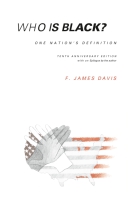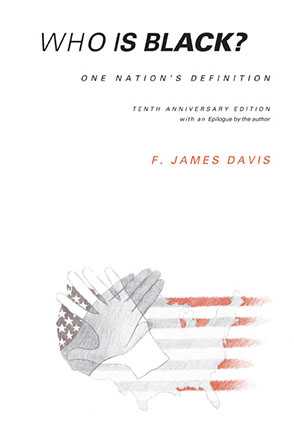Who Is Black?
One Nation's Definition
F. James Davis
“Nothing has been more fateful for the history of race in America than our peculiar decision to categorize as ‘black’ every person known or believed to have any degree of African ancestry. Now Professor Davis has provided us with a much needed, richly informative study of the ‘one-drop rule’ and its consequences. An important, provocative contribution.”
- Media
- Description
- Reviews
- Bio
- Subjects
Winner, 1992 Outstanding Book on the Subject of Human Rights, Gustavus Myers Center for the Study of Human Rights in the United States
According to the one-drop rule, anyone with at least one African black ancestor is black, even if the individual appears to be white. The rule originated during the era of slavery in the South and has come to be taken for granted, strongly supported by blacks and whites alike. No other nation defines a black person in this fashion. Davis provides a comparison of the one-drop rule with six other ways of defining the status of racially mixed persons in societies around the world, from Latin America to South Africa. No other racially (biologically) distinctive minority group in the United States is subject to a one-drop rule. The concept of "passing as white," which reflects the one-drop rule, applies only to persons with some African black ancestry. As a consequence, persons with even very small fractions of black ancestry cannot be assimilated in the United States as people with one-fourth or less American Indian or East Asian ancestry can be.
Davis discusses the dilemmas of racial identity experienced by well-known public figures, including Lena Home, Adam Clayton Powell, and Walter White of the NAACP. Conflicts over color in the black community are also discussed, along with such further problems as collective anxieties, the racial identity of transracially adopted children, different modes of adjustment to ambiguities about racial identity, and personal traumas. Finally, the question of potential changes in the one-drop rule is considered in order to demonstrate how entrenched the rule now is in the black community as well as the white, and why.
“Nothing has been more fateful for the history of race in America than our peculiar decision to categorize as ‘black’ every person known or believed to have any degree of African ancestry. Now Professor Davis has provided us with a much needed, richly informative study of the ‘one-drop rule’ and its consequences. An important, provocative contribution.”
“Who Is Black? is a major contribution to our understanding of how ‘race’ is defined in American society. Unlike most other countries in the world, the United States still adheres to the ‘one-drop rule,’ but only for American blacks. The rule doesn’t apply to other racial groups. How and why this rule developed, efforts to change it, and the impact it has had are discussed in clear, non-technical language. Davis has written an important book for social scientists and the public at large.”
F. James Davis is Professor Emeritus of Sociology at Illinois State University and the author of Society and the Law (1962), Social Problems (1970), and Minority-Dominant Relations (1978).
Mailing List
Subscribe to our mailing list and be notified about new titles, journals and catalogs.




